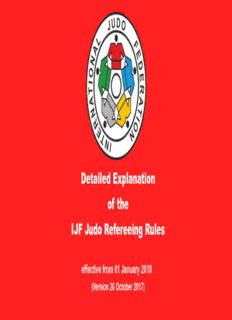
2017-10-26_Explanatory guide of the judo refereeing rules Oct Abu Dhabi_v5 PDF
Preview 2017-10-26_Explanatory guide of the judo refereeing rules Oct Abu Dhabi_v5
Detailed Explanation of the IJF Judo Refereeing Rules effective from 01 January 2018 (Version 26 October 2017) IJF RULES 2018-2020 NEW • Text in black is the same as the 9 June 2017 version • Slides with new text have the new blue icon in the top right corner 2 IJF RULES 2018-2020 Distinguished members of the international judo community, NEW I am pleased to introduce to you our new detailed explanation of the rules effective from 01st of January 2018. In the process of development of our sport, it is of utmost importance to do the best, first of all for the content and the image of our sport, for a better comprehensibility and consistence of the rules for judokas, judo lovers and the World. We are continuously reforming the strategy in all the sectors of the IJF to make our sport a modern one, outstanding and understandable for everyone. I’m convinced the new elements of the rules and judo methodic will be a great benefit for the judo family, spectators, partners and media. Marius L. Vizer President International Judo Federation 3 IJF RULES 2018-2020 NEW Main points from IJF Executive Committee Working Meeting (18/10/2017) • Definition of waza-ari and of ippon, amplification of the evaluation of ippon, more value will now be given. • Definition of bridge and head defence and all the consequences. • Double hansoku-make for negative judo. • Give the power to the central referee on the tatami to do their job and for the supervisors and referee commission to intervene only when there is a major mistake. • Continue to promote positive judo. 4 IJF RULES 2018-2020 Duration of contests • Men and women four (4) minutes. 5 IJF RULES 2018-2020 Evaluation of the points in tachi-waza NEW • There will now only be ippon and waza-ari. • Ippon will be given when the contestant throws his opponent on the back, applying a technique or countering his opponent’s attacking technique, with considerable ability with maximum efficiency (*). (*) “ikioi” = momentum with both force and speed. “hazumi” = skillfulness with impetus, sharpness or rhythm. • Criteria for ippon: 1. Speed; 2. Force; 3. On the back; 4. Skilfully control until the end of the landing. • Rolling can be considered ippon only if there is no break during landing. 6 IJF RULES 2018-2020 Evaluation of the points NEW • Waza-ari will be given when the four ippon criteria are not fully achieved. • The value of waza-ari includes those given for yuko in the past. • Two waza-ari are the equivalent of one ippon (waza-ari-awasete-ippon) and the contest will be finished. 7 IJF RULES 2018-2020 Waza-ari NEW • The value of waza-ari includes those given for yuko and waza-ari in the past. • Landing on both elbows or two arms is considered valid and should be evaluated with waza-ari. • Landing on one elbow, on the bottom or the knee with immediately continuation on the back will be waza-ari. 8 IJF RULES 2018-2020 No waza-ari 9 IJF RULES 2018-2020 Bridge Head defence NEW • Voluntary use of the head • All situations of voluntarily landing in the for defence to avoid bridge position, will be considered ippon. landing in / escaping from a score will be given hansoku-make. 10
Description: